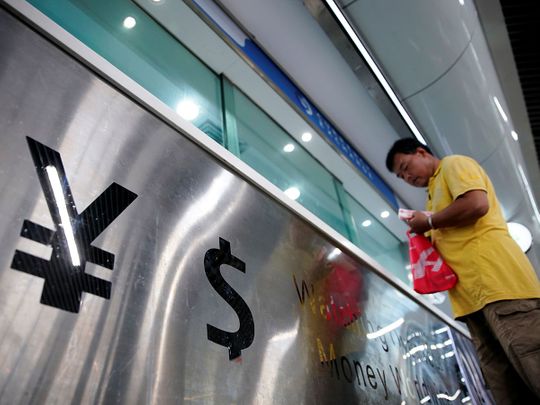
Highlights
- China's COVID-zero policy has weighed on economic growth.
- This makes it hard for the central bank to defend certain levels, despite signs of Beijing relaxing its control on cross-border traveling.
China's yuan is expected to weaken further after the Communist Party Congress ends this weekend, as the central bank loosens its grip on the currency, according to market watchers.
Around 90% of the 30 yuan traders who responded to a Bloomberg survey this week forecast the People's Bank of China to ease its tight-ranged fixing after the twice-a-decade party congress wraps up on Saturday.
Half of them said they expect the yuan to be pushed to 7.4 or even 7.5 per dollar within the year, and only 10% saw it staying at around the current level of around 7.25.
The PBOC set steady yuan fixing ahead of and during the party congress to limit depreciation, but it failed to prevent the offshore unit from falling to fresh lows amid surging Treasury yields and global demand for the dollar.
China's Covid-zero policy has weighed on economic growth and made it hard for the central bank to defend certain levels, despite signs of Beijing relaxing its control on cross-border traveling.
"I think China will allow the depreciation trend to resume and the fixing will climb again soon after the party congress," said Alvin T. Tan, head of Asia FX strategy at RBC Capital Markets. Upside pressure continues to build on dollar-yuan as US interest rates are pushing higher while yuan funding costs are tumbling, he said.
The PBOC has set the yuan fixing at stronger-than-expected levels than the median forecasts in Bloomberg's daily surveys since late August - a warning against speculative, bearish bets. Despite that, the yuan has declined versus 22 of the 24 trading peers' currencies in the CFETS basket in the past five days. The onshore yuan's fall versus the dollar has extended to over 12% this year, and is set for the worst annual depreciation since 1994.
"We think the PBOC maintains FX stability now as the party congress is ongoing, but beyond this PBOC does not show strong intention to defend any specific levels of USD/CNY," said Peiqian Liu, chief China economist at NatWest Group. She expects "fixing errors," or the gap between the fixing and forecasts, to ease off once the congress ends, although in the longer run "it depends largely on the dollar momentum when the PBOC gradually loosen its grip on fix."
Traders are waiting for the release of China's economic indicators, including gross domestic product, as the party congress nears its end. The GDP data was originally slated for release Tuesday but was delayed, with no reason or new publication date given, an unprecedented case which added to investor concerns.
China's economic uncertainty and the likelihood of widening US-China yield differentials mean the yuan is likely to stay soft into next week, particularly if the dollar retains its broad strength, said Carie Li, a global market strategist at DBS Bank in Hong Kong.
"With the party congress prioritizing supporting growth, it is possible for the PBOC to further loosen monetary policy such as cutting reserve requirement ratio to boost credit," she said.
Asked what they thought would be the PBOC's priority in managing the yuan this year, 40% said they saw it as the currency's stability versus a basket of currencies, while roughly as many said it would be to avoid any sharp depreciation against the dollar. Only 10% said that keeping the yuan within its recent range would be a key target.












